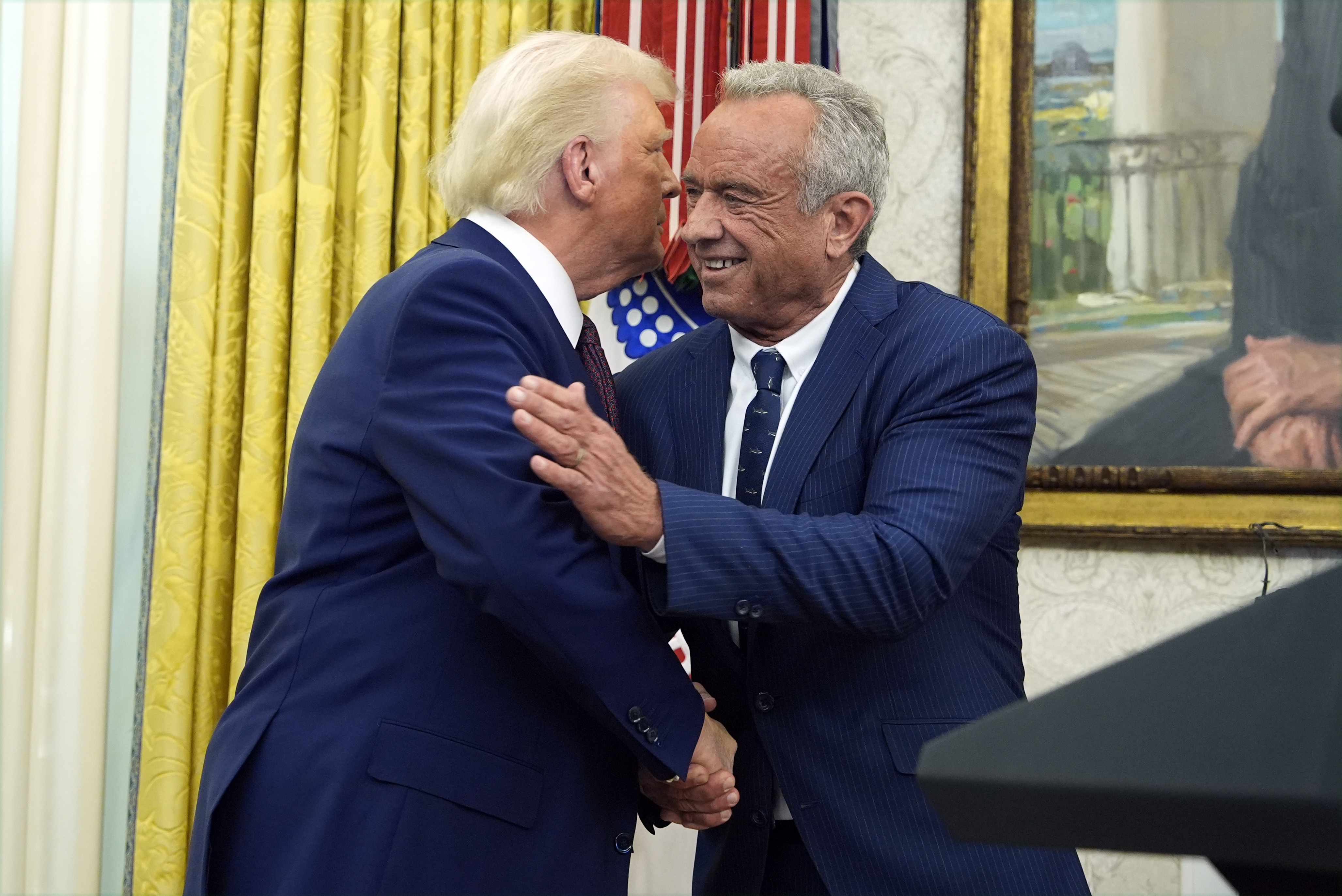
What to Know
- A budget plan in Congress would likely slash hundreds of billions of dollars from Medicaid, which provides health care coverage to 83 million people.
- Many of the Americans on Medicaid are low-income adults and children, seniors and people with disabilities.
- Medicaid covers a wide range of care, including 41% of births in the country, nursing home care for millions of seniors and medications for people with mental illnesses.
- Children are a large percentage of Medicaid recipients, and many disabled children have Medicaid for complex medical issues.
Health care coverage for millions of Americans is under threat if federal lawmakers move forward with proposed spending cuts.
House Republicans adopted a budget resolution that would require the committee that oversees Medicaid to come up with $880 billion in savings over the next 10 years. If that resolution passes the finish line, there’s no way for Congress to reach that number without significant cuts to the health program, the Congressional Budget Office confirmed in a letter Wednesday.
“This letter from CBO confirms what we’ve been saying all along: The math doesn’t work without devastating Medicaid cuts,” Rep. Frank Pallone, D-N.J., said.
We've got the news you need to know to start your day. Sign up for the First & 4Most morning newsletter — delivered to your inbox daily. Sign up here.
The CBO's letter was in response to a query by Pallone, the ranking member of the Energy and Commerce Committee, and Brendan Boyle, D-Pa., the ranking member of the Budget Committee.
"It's a really scary time to be relying on Medicaid services," said Lucy Beadnell, director of advocacy for the Arc of Northern Virginia, a branch of the national nonprofit that helps people with disabilities.
Beadnell said the news of potential cuts has "panicked" people with disabilities and families who rely on Medicaid.
Health
Adding to concerns about federal cuts, D.C., Maryland and other states are grappling with budget shortfalls that could jeopardize Medicaid coverage.
D.C.'s Medicaid program is facing "unprecedented challenges" as the city faces a budget shortfall of more than $1 billion over the next few years, the head of D.C.'s Department of Health Care Finance (DHCF), Wayne Turnage, said in a public notice Monday.
Turnage said a Medicaid budget gap of more than $173 million for fiscal year 2026, a decline in forecast revenue and the potential federal cuts mean DHCF's budget proposals could "fundamentally reshape the District's Medicaid program."
D.C.'s Medicaid eligibility, benefits and provider rates are all "on the table," he said in the notice.
As concerns of Medicaid cuts grow, here's more on what it is, who it covers and what could happen if the federal government pulls billions in funding.
What is Medicaid?
Medicaid is a program that provides comprehensive health coverage and long-term care to millions of Americans, many of whom are low-income, disabled and seniors.
"Medicaid is complex, but Medicaid is a key part of our health care system," said Liz Williams, a senior policy manager at KFF, a nonpartisan health policy nonprofit.
Part of what makes Medicaid so complex is that both the federal government and states fund the program, which finances a fifth of all health care spending in the country.
Safety net hospitals and clinics that provide care to people regardless of their insurance status or ability to pay also get financial support from Medicaid, Williams said. Examples of safety net providers in the D.C. area include MedStar Washington Hospital Center and Children's National Hospital in D.C., University of Maryland Capital Region Medical Center in Largo, Maryland, and the Inova Juniper Springfield/Fairfax clinic in Fairfax, Virginia.
Who does Medicaid cover?
More than 83 million people — about one in five Americans — have Medicaid, according to KFF. Low-income adults and children, seniors and people with disabilities depend on Medicaid for their health coverage.
Beadnell said 100,000 disabled children and adults in Virginia have Medicaid for long-term care, which means they need in-home caregivers or other special services.
"We've got people who have around-the-clock nursing needs who still, in late teens, 20s, 30s, 40s, 50s, 60 years of age, are living with parents who for many decades have never had a full night's sleep, and the only relief and break they ever get are through trained Medicaid-waiver caregivers," Beadnell said.
"All of these folks are already rolling a boulder up a hill every day to try and hold things together, and the idea of cutting, which just doesn't seem to be any room to spare, is catastrophic, absolutely terrifying and literal life and death concerns for our folks."
Medicaid also covers about 41% of all births in the United States and almost one-third of people with a mental illness, Williams said.
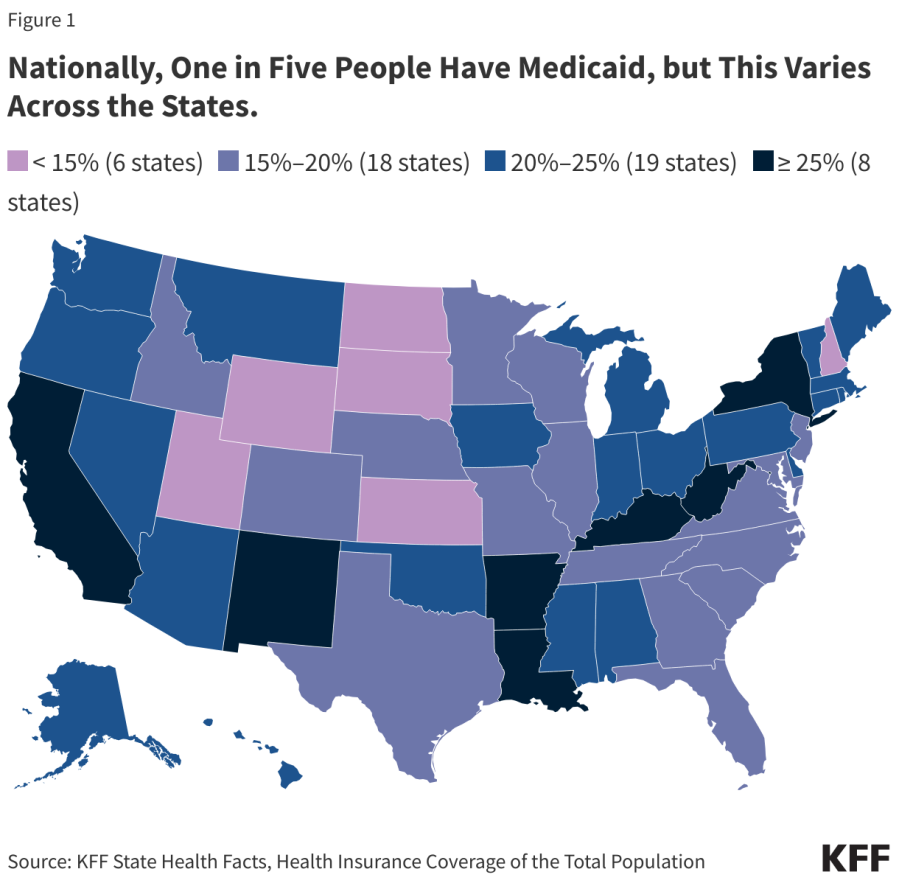
Williams said many people might not realize that children make up a larger percentage of Medicaid recipients than seniors and people with disabilities combined. In 2023, nearly 39% of children in the U.S. were on Medicaid, according to KFF data.
"Medicaid also covers about four in 10 children in the U.S. and eight in 10 children in poverty. So it's a really important source of coverage for children broadly," she said.
Of the 74 million children in America, more than 37 million of them are on Medicaid or Children’s Health Insurance Programs (CHIP), according to Medicaid.gov.
Although there are fewer seniors and people with disabilities on Medicaid, they account for more than 50% of Medicaid spending. Fourteen percent of Medicaid spending is on children.
How many people have Medicaid in DC, Maryland and Virginia?
More than 3 million people are covered by Medicaid in D.C., Maryland and Virginia combined.
In D.C., nearly a quarter of residents, more than 264,000, are on Medicaid, according to KFF's data. Medicaid covers four out of five nursing home residents in the city, and three out of seven children. Nearly 60% of adults on Medicaid in D.C. are working, and the vast majority of enrollees are people of color.
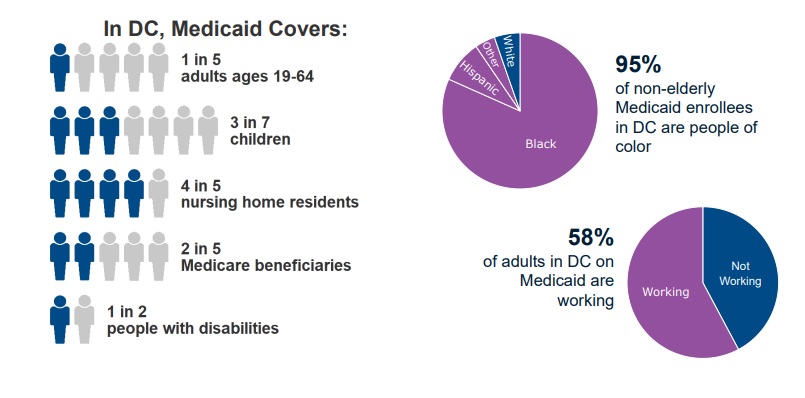
More than 1.6 million Maryland residents are on Medicaid, or about 20% of the population. Five of every eight nursing home residents have Medicaid, and 63% of adults on Medicaid work. One in three children in Maryland have Medicaid.
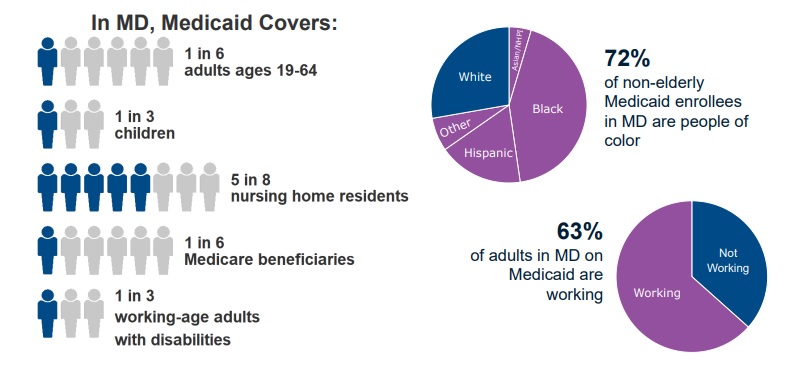
Virginia has more than 1.8 million people enrolled in its Medicaid program. That includes five out of eight nursing home residents and three out of 10 children.
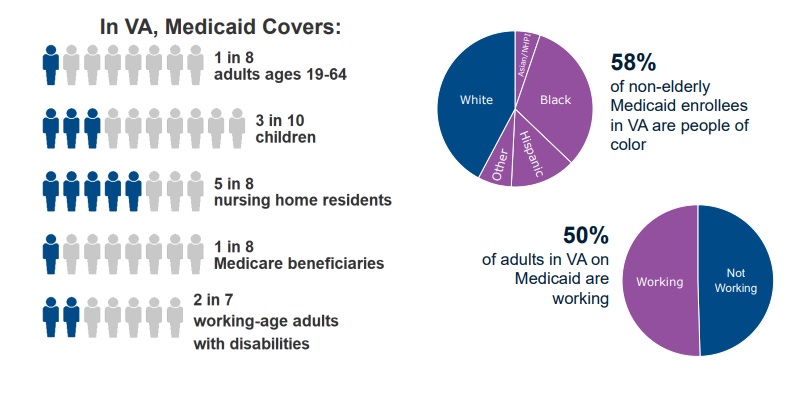
DC, Maryland and Virginia are all part of Medicaid expansion
D.C., Maryland and Virginia have all adopted the Affordable Care Act's Medicaid expansion, which allows more people with low-incomes who couldn't previously qualify for Medicaid to be eligible for coverage.
"There's about a third or more expansion enrollees across Maryland, D.C. and Virginia," Williams said.
Virginia is one of 12 states that currently have “trigger” laws in place to automatically end the expansion or require changes if federal contributions drop below 90%. Nearly 760,000 Virginians in the expansion would lose coverage, KFF estimates.
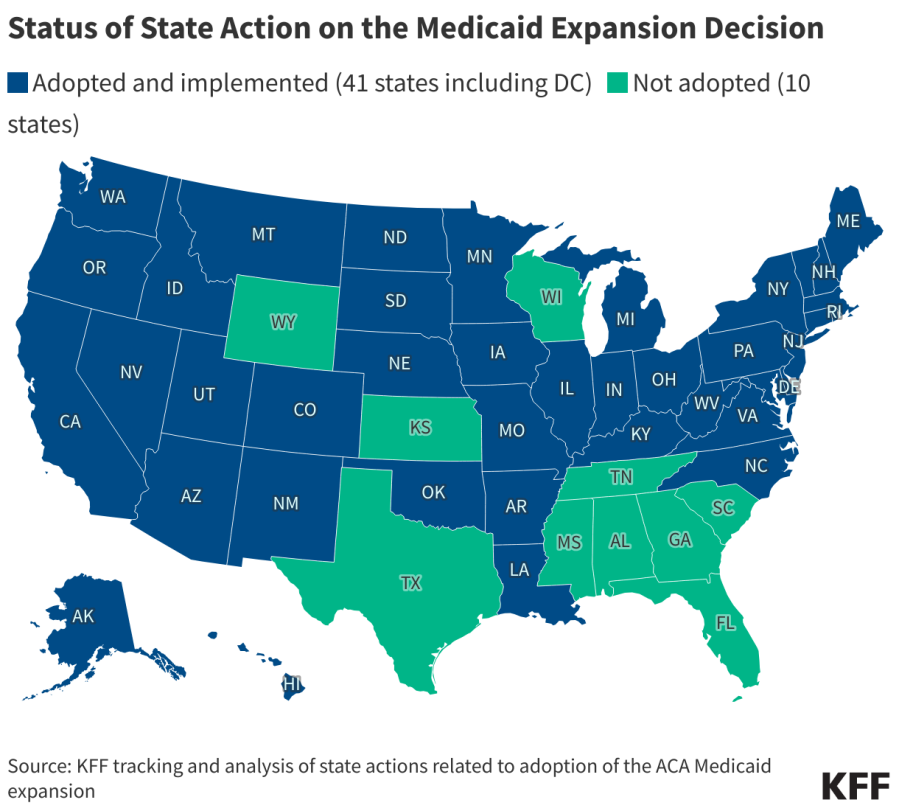
What could happen if there are major cuts to Medicaid?
If the federal government slashes Medicaid spending, it's still unclear what policies lawmakers would roll out to reach their budget goals.
Eliminating federal funding for people in the expansion is one option. Another option is to cap the amount of money the government contributes to Medicaid on a per-enrollee basis.
"But there's also a number of other proposals on the table, including Medicaid work requirements, limiting provider taxes in Medicaid and some other things. So there's a lot of things on the table and we're not sure sort of what will be in the final bill," Williams said.
What happens to Medicaid after the feds make cuts is murkier territory. It could vary widely from state to state, because it's the states — and D.C. — that administer the health program within broad federal rules. That means it will be up to the states to decide how they might try to make up for lost federal funds.
"So, no matter what the policy changes, if there are federal funding cuts to Medicaid, states are going to have to make tough decisions about coverage, about how much they pay providers and what benefits they provide, because it's going to be challenging to offset the loss of those federal funds," Williams said.
Some could compensate by raising taxes or making cuts in other areas like education or transportation, for example. Other states might choose to put more limits on Medicaid eligibility or drop expansion enrollees, if the federal government doesn't do that first.
"States could also make changes to the benefits that they provide and, you know, limit the benefits that they provide. Or states could pay providers like hospitals and nursing homes less. So there's a lot of trade-offs and a lot of tough choices for states, you know, if these cuts were to come to fruition," Williams said.
“Congress is very unlikely to say, ‘Dear states, you need to cut coverage for people with disabilities,’” Allison Orris, the director of Medicaid policy at the Center on Budget and Policy Priorities, told NBC News. “All of those hard decisions are going to be left for states to make, and it’s hard to say that any population would be spared, especially if you get into the realms of cuts that are big enough that lead to hospitals closing and impacting access to care.”
One thing is clear: The ripple effects from Medicaid cuts will be far-reaching.
"More uninsured people can have an impact on health outcomes, financial security for families. People would not be able to access the care that they need and would be more at financial risk and in more financial stress," Williams said.
How can Medicaid recipients prepare for cuts?
Experts News4 has interviewed thus far have said there's not much recipients can do aside from reaching out to their representatives in Congress and speaking up about why they need Medicaid.
Many rely on the program as a last resort and don't have savings they can turn to.
"Medicaid offers very, very little coverage to people if they have any other kind of insurance, and most people with other insurance can't get Medicaid at all. So it's very hard to create a backup if you only became eligible for Medicaid because you couldn't get any other health care and you're in poverty," Beadnell said.
"We know a lot of people just rely on Medicaid alone. And without Medicaid, it's likely a number of people would not have access to an affordable source of coverage," Williams said.
Will my Medicaid coverage be cut?
It's too soon to know which enrollees or what specific Medicaid programs could get cut.
Stay with News4 as we continue to follow potential cuts at both the state and federal level.
Sign up for our free deep-dive newsletter, The 4Front, to get standout News4 stories sent right to your inbox. Subscribe here.


